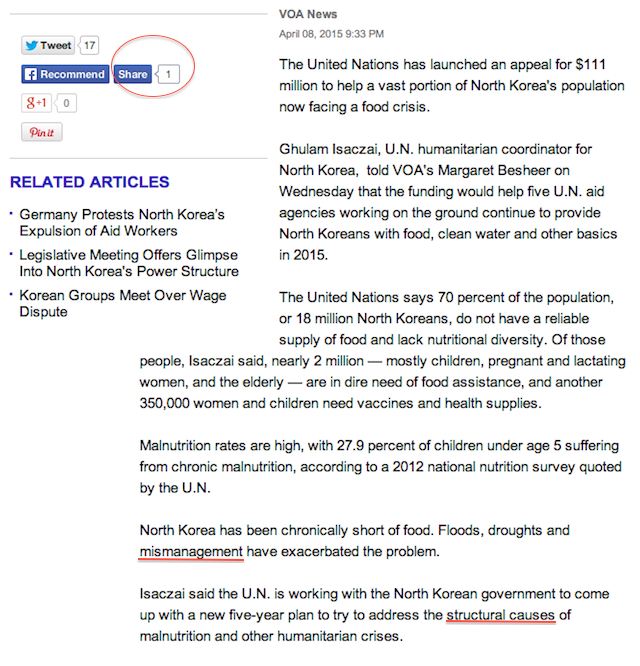BBG Watch Commentary
According to U.S. taxpayer-funded Voice of America (VOA) VOA (English) News, “floods, droughts and mismanagement [Emphasis added.] have exacerbated the problem” of chronic food shortages in North Korea.
This sentence seems to have been written by VOA News since it is not attributed to anyone.
VOA also reported that “the United Nations has launched an appeal for $111 million to help a vast portion of North Korea’s population now facing a food crisis.”
We are curious what the Voice of America means by “mismanagement”?
Is “mismanagement” some kind of a new VOA News euphemism for a dictatorship that produces nuclear weapons, spends vast amounts of money on its conventional army, security services and party elite, severely represses and starves its own people but cannot feed them?
We are also wondering, as VOA’s international audiences also might be, what are “structural causes” [Emphasis added.] of malnutrition and other humanitarian crises in North Korea?
Voice of America quotes Ghulam Isaczai, U.N. humanitarian coordinator for North Korea, using the “structural causes” term, but shouldn’t VOA as a news organization expand on the meaning what appears to be U.N. diplomatic language worthy of a press release but not a news report?
 Voice of America seems to have a unique approach to its news reporting about North Korea. Some critics claim this also extends to Iran.
Voice of America seems to have a unique approach to its news reporting about North Korea. Some critics claim this also extends to Iran.
In 2011, a VOA video news report from North Korea and a VOA press release showed well-stocked stores and well-fed children in North Korean capital Pyongyang. According to the 2011 VOA press release, a Voice of America correspondent described Pyongyang in his report as a city as “vibrant and busy with activity.”
The latest VOA report has information that is accurate and newsworthy, such as a quote from the U.N. official that “nearly 2 million — mostly children, pregnant and lactating women, and the elderly — are in dire need of food assistance, and another 350,000 women and children need vaccines and health supplies.”
But the VOA report is extremely vague on the real causes of these problems. We are not advocating propaganda, pejorative terms or labels, distorting, or dramatizing the situation. What we would like to see is more direct news language.
The VOA Charter says that “VOA news will be accurate, objective, and comprehensive [Emphasis added.]. Perhaps Voice of America should have used a more descriptive language, as it did in its 2011 video, to explain “mismanagement” and “structural causes” in its latest news report about North Korea?
There was another North Korea news Wednesday which was not reported by VOA News. Inner City Press reporter Matthew Russell Lee had this report on North Korea blaming U.S. for detention of Mudubong ship by Mexico. Matthew Russell Lee, whom a VOA official had tried unsuccessfully to get removed in 2012 from covering the U.N., reported on a press conference Wednesday at the North Korean mission to the U.N. dealing with an international news story that the Voice of America should have perhaps also reported on.
While VOA missed this story even though North Korea made accusations against the U.S. and there may be Cuban involvement in illegal arms shipping to North Korea, BBC had a report: “N Korea urges Mexico to free detained ship | BBC.”
BBC quoted U.S. envoy to the U.N., Samantha Power, describing the episode as a “cynical, outrageous and illegal attempt” by Cuba and North Korea to circumvent UN sanctions. The BBC report was balanced and comprehensive.
Should VOA News not be reporting on this? It’s good that BBC and Matthew Russell Lee are still reporting on North Korea from the U.N.
Photo: #NorthKorea diplomat An Myong Hun at presser about Mudubong ship held in Mexico, story soon pic.twitter.com/VudDpbx3Rf
— Inner City Press (@innercitypress) April 8, 2015
###
VOICE OF AMERICA REPORT
UN Seeks $111M to Help Feed N. Korea
VOA News Report Screen Shot 2015-04-08 at 11:16 PM ET. From 9:33 PM to 11:16PM, the VOA report is showing only 1 Facebook “Share.”
VOA News
April 08, 2015 9:33 PM
The United Nations has launched an appeal for $111 million to help a vast portion of North Korea’s population now facing a food crisis.
Ghulam Isaczai, U.N. humanitarian coordinator for North Korea, told VOA’s Margaret Besheer on Wednesday that the funding would help five U.N. aid agencies working on the ground continue to provide North Koreans with food, clean water and other basics in 2015.
The United Nations says 70 percent of the population, or 18 million North Koreans, do not have a reliable supply of food and lack nutritional diversity. Of those people, Isaczai said, nearly 2 million — mostly children, pregnant and lactating women, and the elderly — are in dire need of food assistance, and another 350,000 women and children need vaccines and health supplies.
Malnutrition rates are high, with 27.9 percent of children under age 5 suffering from chronic malnutrition, according to a 2012 national nutrition survey quoted by the U.N.
North Korea has been chronically short of food. Floods, droughts and mismanagement have exacerbated the problem.
Isaczai said the U.N. is working with the North Korean government to come up with a new five-year plan to try to address the structural causes of malnutrition and other humanitarian crises.

